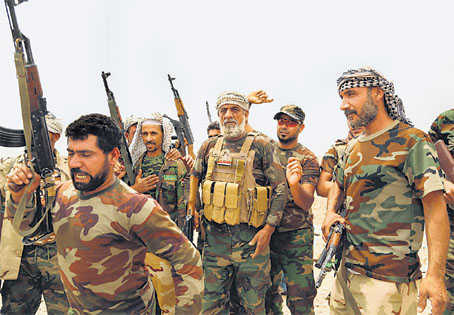
Shia militia chant slogans against the Islamic State on the outskirts of Fallujah, Iraq, on June 1, 2015. AP
G Parthasarathy
Over the past quarter of a century following the collapse of the Soviet Union, India has successfully fashioned a new and innovative approach of economic integration with the fast-growing economies of East and South East Asia. As a “dialogue partner,” our economy is now substantially integrated with the economies of the 10-member ASEAN, extending eastwards from Myanmar to Vietnam. We have “comprehensive economic partnerships” with the “tiger economies” of Japan and South Korea. Our economic ties with the 21st century superpower, China, are set to grow. As a member of the East Asia Summit, India participates actively in fashioning security dynamics for the Indo-Pacific region.
National Security Adviser Ajit Doval recently spelt out the security challenges that India faces. He slammed China for its border claims in Arunachal Pradesh, while stressing the importance of maintaining peace on our eastern borders. India is fashioning a diplomatic strategy to counter Chinese "assertiveness," marked by closer ties with China's maritime neighbours, ranging from Japan to Vietnam and Myanmar. These moves are reinforced by consultations with the US to build a stable balance of power along and beyond our eastern frontiers. There can, however, be no substitute for defence modernisation, while upgrading our infrastructure on our eastern borders.
While the framework for enhanced security and cooperation on and beyond our eastern borders is taking shape, the same cannot, unfortunately, be said of developments across and beyond our western borders. Ajit Doval warned of security challenges flowing from the US withdrawal from Afghanistan. It is clear that President Obama's withdrawal plans are coupled with moves to establish a de facto Washington-Beijing-Rawalpindi axis, which seeks to “accommodate” the Taliban, giving it control of substantial parts of south-eastern Afghanistan. This plan also involves substantial arms transfers by the US to Pakistan, including F 16 fighters, potent air-to-air missiles, jet trainers and armoured personnel carriers. Moreover, while Americans may pay lip-service and make symbolic gestures on bringing the likes of Zakiur Rehman Lakhvi for justice, they will really not do anything that causes discomfiture to Pakistan's de facto rulers — its army establishment. It would be naïve for India to expect effective American support in confronting ISI-sponsored terrorism.
The political uncertainty in the Af-Pak corridor bordering India has been accompanied by the entire “Greater Middle East” from Iran to Algeria, being torn apart by civil wars, sectarian violence and Persian-Arab rivalries. The impending US-Iran nuclear deal has sent shock waves through the Arab world and particularly in the oil-rich monarchies of the Gulf Cooperation Council. It could change power equations in much the way that the Nixon-Mao rapprochement did in the 1970s. The angst in Saudi Arabia is evident in the manner in which the normally cautious Saudis have hit out militarily at Yemen, ostensibly because of growing Iranian influence. This is a miscalculation for which Saudi Arabia will inevitably pay a high price.
The Americans did precious little to back their long-term allies — the Gulf monarchies — in their intervention in Yemen. Saudi Arabia was dumped even by its Islamic brethren like Pakistan and Egypt. American client states in the Arab world appear to have not realised that after becoming the world's largest oil producer and being set to become a major exporter of natural gas, the US is really no longer too concerned about the fate of the Arab ruling elites. India cannot, however, remain sanguine about these developments. Over 70% of our oil imports come from this region, where six million Indians, who remit back $45 billion annually, live. Moreover, the real epicentre of Shia-Sunni tensions is Iraq, which has the potential to re-emerge as a major partner. New Delhi has to embark on new and imaginative diplomatic initiatives with the Gulf Arab monarchies, Iraq and Iran.
The advance of the ISIL in Iraq and neighbouring Syria has sent shockwaves internationally. The ISIL now controls half of Syria and virtually the entire Syrian-Iraqi border. It rules Mosul and the ancient Assyrian city of Nimrud. It has also seized control of Ramadi, the capital of Iraq's Sunni dominated Anbar province. What has been shocking is the ineptitude of the American-equipped and Shia-dominated Iraq army, which has appeared incapable of fighting unless backed by Iranian-trained, Iraqi Shia militia. The Iraqi army has to be made inclusive and professionalised to take on the ISIL effectively.
The ISIL and the Taliban share much in common. The barbarism that marked Taliban rule was evident from their wanton blowing up of the ancient and giant Buddha statues in the Bamiyan Valley on the orders of Mullah Omar in March 2001. Taliban Foreign Minister Mullah Muttawakil justified this barbaric destruction, proclaiming that they were merely following the Islamic edicts of iconoclasm! The Taliban required Hindus and Sikhs to wear identity labels on their clothing. The ISIL went one step further. Captured non-Muslims are treated as slaves and their women abducted and outraged. In Mosul and Nimrud, the ISIL bulldozed architectural treasures, monuments and museums with the assertion that Prophet Mohammed destroyed such idols with his own hands when he entered Mecca.
The Taliban, who colluded with the hijackers of IC 814, have repeatedly attacked Indians and Indian diplomatic and consular establishments in Afghanistan. There is no reason to believe they will change when by courtesy of the Obama Administration, the Xi Jinping dispensation, the ISI led by General Rizwan Akhtar and Afghan President Ashraf Ghani, they seize control of territory in Afghanistan as the ISIL is doing in Iraq and Syria. The ISIL has been described as “the most explosive Islamic movement the modern world has seen”. Is Mullah Omar’s Taliban any different? Should we not formulate a comprehensive “act-West policy” to address these serious issues across and beyond our western frontiers?



























